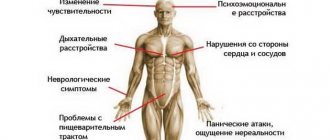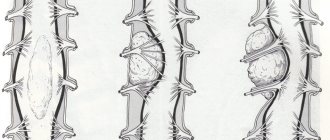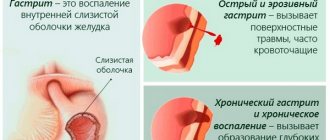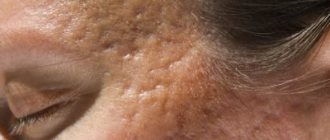Pain in the heart and behind the sternum is a common complaint with which patients come to see a therapist or cardiologist. However, you should not neglect pain in the heart; it can be caused by various reasons, mostly very serious. The appearance of pain may be associated with organic changes in the heart and coronary arteries, and with functional disorders. The cause of pain in the heart area may be damage to organs or structures that are located near the heart (cardiac sac, aorta, intercostal nerves, ribs, muscles of the left half of the chest).
Why can heart problems be caused by nerves?
In order to understand this issue, you need to remember what stress is. In essence, this is the body’s reaction necessary to adapt to changed conditions. In modern society, stress is always present. It can be either negative (has a negative effect on the body, leading to the development of diseases) or positive (associated with joyful emotions - for example, the state of falling in love).
At the same time, both types of stress trigger the same biochemical reactions in the body. Critical, from the point of view of cardiac manifestations, are the duration and strength of stress.
Everything is in sight
It is easiest to correlate superficial chest pain with skin lesions - it is clearly visible, and external symptoms are enough for diagnosis. So, in dermatological diseases, thoracalgia is characteristic of herpes zoster
and
erysipelas of the skin.
Shingles is a viral disease (herpes) accompanied by blistering rashes and burning pain, similar to neuralgia. The pain appears first, lasts for several days, periodically intensifying, and only then blisters form. Infectious erysipelas (streptococcus) is preceded by microtraumas - cuts, scratches, abrasions on the skin. When the inflammatory process begins, the picture cannot be confused with anything - spotty redness, swelling, general and local increase in temperature (sore areas feel hot to the touch). The pain is sharp, point-like.
What happens in the body under stress?
Activation of the nervous system is transmitted to the hypothalamic-pituitary system, which in the body performs the function of a conductor: it determines, controls and coordinates the work of a variety of organs and systems. As a result of this activation, hormones of the adrenal cortex are released, in particular adrenaline and cortisol, which leads to increased heart rate, increased blood pressure, and spasm of blood vessels, including the vessels of the heart (coronary arteries).
In this situation, the flow of oxygen and nutrients to the heart muscle (myocardium) may be reduced, which causes ischemia and pain in the chest.
Photo: Giulia Bertelli, unsplash.com
Do not forget that when your heart rate increases, your breathing also increases. When a person begins to breathe frequently, the diaphragm simply does not have time to contract (it is switched off from the act of breathing), and only the intercostal muscles work. They get tired quickly and feel uncomfortable.
Together, these factors most often cause “strange” sensations in the heart area.
Pain relief
Heart diseases can be associated with the nervous system and its exhaustion. To relieve discomfort, you can take sedatives, drink tea with herbs, and try to calm down with breathing exercises.
Adequate sleep, proper nutrition, correct work and rest schedule will help improve the situation. The cause of the sensations is the nerves, which means that if you calm them down, the unpleasant manifestations will go away.
It is advised to take a bath with herbs. You can use aromatic oils (but not hot).
It is useful to take a foot bath, listen to calm music, perform self-massage of the feet and body, lie on the bed and try to calm down.
It is important to get rid of obsessive thoughts at this moment. They are often a conductor of unpleasant sensations in the body.
How to understand that these are just feelings of stress and not a real illness?
There are many reasons that cause pain in the heart area.
They can be both diseases of the cardiovascular system (for example, coronary heart disease), and pathologies of other organs of the chest (hiatal hernia, pleurisy, mediastinitis, and so on). Often the pain is associated with muscle spasm or strain and occurs due to compression of the nerve roots or spinal nerves.
Please note: it is quite difficult to understand the nature of pain on your own. Often pain is associated with the presence of a disease that has its own causes of development. But any of the conditions under consideration can be triggered or aggravated by stress.
If you think about the seriousness and significance for life and health of pain in the chest under stress, the range can be very wide: from relatively safe and prognostically favorable somatoform dysfunction of the autonomic nervous system to an attack of angina pectoris (“angina pectoris”) and even myocardial infarction .
Photo: unsplash.com
Treatment of heart pain
If heart pain occurs suddenly, you must urgently stop what you are doing, try to calm down and sit or lie down. If the pain in its characteristics is very similar to angina pain, then you need to put a nitroglycerin tablet under the tongue. If it is not there, then you can drip a few drops of Corvalol, valerian, or take a Corvalment capsule under your tongue.
If the pain is severe and does not go away for a long time - half an hour or an hour, it is necessary to urgently call an ambulance. Before their arrival, the patient should not worry or do even the smallest amount of work. He just has to lie down. Prolonged intense pain in the heart may indicate a myocardial infarction, therefore the slightest psycho-emotional or physical stress is contraindicated for the patient.
If you had an attack of heart pain that vaguely resembled an attack of angina pectoris, and it went away on its own or after taking nitroglycerin, then you also need to visit a doctor as soon as possible. After all, such pains do not arise on their own. This is a signal from the body that there are serious problems in the heart. This is not a sore throat or a scratch. Under no circumstances should you self-medicate or neglect heart pain, as this can lead to myocardial infarction or even death. If you have heart pain, you must visit a doctor, undergo a thorough examination and follow the doctor’s recommendations in detail.
How to distinguish pain due to stress (cardioneurosis) from pain due to angina pectoris?
The nature of the pain syndrome differs in these conditions.
Patients with angina pectoris feel pressure, compression or burning in the chest during physical (for example, climbing to the 2nd-3rd floor) or emotional stress. These sensations can “radiate” to the arm, under the shoulder blade, or lower jaw. Pain due to autonomic dysfunction (what we call “stress” - TUT.BY note) often appears after physical activity and is stabbing in nature. Also disturbing is the feeling of a foreign object, a coma in the throat, lack of air, sweating.
Another important point is the duration of the pain. From a stressful experience, pain sensations can be short-term or, conversely, last for hours or days. And with angina pectoris, attacks lasting up to 15-30 minutes occur regularly, often predictably, in response to a level of physical activity known to the patient or emotional stress.
Other signs of cardioneurosis include palpitations (if you feel it, normally you should not pay attention to it. - Note TUT.BY), interruptions in heart function, fluctuations in blood pressure, a feeling of dissatisfaction with breathing, the inability to take a deep breath, feeling lack of air, nausea, dry mouth, loss of appetite, sweating, general weakness and increased fatigue.
Cardialgia in lung diseases
When the respiratory system is affected, chest pain has the following characteristics:
- characterized by an acute but short-term nature;
- as a rule, no irradiation of pain is observed;
- the pain intensifies with deep inspiration;
- the presence of pulmonary symptoms such as cough, sputum production, shortness of breath;
- dry or moist rales, percussion data indicating lung damage.
It is worth noting that most often pain in the heart when inhaling is observed with the development of pleurisy. With this pathology, it can have a different distribution. With inflammation of the parietal pleura, pain is localized in the lower parts of the chest. In the area of the shoulder blades, pain appears if the parietal pleura of the upper lobe of the lung is affected. If apical pleurisy is diagnosed, then due to irritation of the brachial plexus, concomitant pain in the arm may be observed, and with diaphragmatic pleurisy, pain extends to the abdominal area and is accompanied by vomiting. That is why for correct diagnosis it is important to clearly determine where it hurts. This helps to distinguish true cardiac pain from clinical manifestations of pulmonary damage. It is important to remember that cardialgia in respiratory pathology cannot be considered a leading clinical syndrome. More specific manifestations are taken into account (cyanosis, fever, signs of intoxication, cough, shortness of breath, sputum production).
What diseases can regular stress lead to?
Stress is inevitable, and it can actually lead to serious problems in the future.
With prolonged severe stress, the risk of developing arterial hypertension, coronary heart disease, gastrointestinal diseases, mental disorders and sexual dysfunction is significantly increased. In the presence of a chronic disease, excessive nervous tension can lead to exacerbation and even a life-threatening situation.
Photo: Robina Weermeijer, unsplash.com
Let's take atherosclerosis as an example:
— Let’s imagine that a person has a plaque in the vessels of the heart that narrows the lumen by 30–40%. At rest, such a person will feel absolutely normal, since the blood supply to the heart is sufficient. With stress or shock, vascular spasm additionally occurs - and now they are already closed by 70-80%. In such a situation, the heart muscle does not have enough blood, especially since stress requires it more than usual. Myocardial ischemia occurs and pain occurs.
It is important to understand that emotional stress leads to increased blood pressure. And, if stress is regular, this can lead to arterial hypertension - the body will get used to it, and the pressure will be constantly increased, which will require antihypertensive therapy.
Another striking example of the effect of stress on the heart is Takotsubo cardiomyopathy (broken heart syndrome). This disease develops as a result of severe stress and a large release of catecholamines (adrenaline, norepinephrine, dopamine), which “break” the heart due to their toxic effect for several hours. The myocardium loses its elasticity, expands, and cannot cope with its work. Heart failure develops.
What to do if your heart hurts due to stress?
First of all, of course, it is necessary to understand the causes of the pain syndrome, to exclude the presence of cardiovascular diseases that pose a threat to life and require individual therapy. For example, an attack of angina pectoris is traditionally well controlled by nitrates.
The right decision when heart pain occurs is to consult a cardiologist in a timely manner, undergo the necessary tests, understand the causes of the disease and receive clear recommendations on behavior during an attack.
Photo: pixabay.com
The risk of serious cardiovascular disease increases significantly after age 45. The older a person is, the higher the risk of cardiovascular pathology. For early detection of diseases, there are medical examination programs in clinics and comprehensive cardiac screenings in private medical centers, which allow a comprehensive examination of the heart and blood vessels in a minimum number of visits.
Also, do not forget that diseases are getting younger and problems can appear at 35 years of age or earlier. If you are young, your risk of having cardiovascular disease is lower, but not completely excluded. Constant stress can contribute to the early onset of heart pathology, therefore, if you have complaints after consulting a cardiologist, recording an ECG, excluding other causes and conditions that explain pain, it is advisable to find your own effective strategy for dealing with stress. Including the participation of a psychotherapist (if necessary), who will help you recover emotionally and prescribe the necessary medications.
Prevention
The smartest thing to think about is not how to strengthen the heart after stress, but how to avoid getting into a similar situation. The best prevention would be to identify the likely source of trauma to the psyche and try to avoid it whenever possible. You need to learn to cope with negative emotions without leading to heartache. Experts recommend the following things for this:
- It’s better to let the stress out like steam, for example, scream to your heart’s content.
- Increase the proportion of green color in the interior, which has the most beneficial effect on the state of the nervous system.
- Increase your consumption of seafood and bananas, which help saturate the body with serotonin, the “hormone of joy.”
- Nervous tension is well relieved by various hobbies, especially those related to sports and active recreation. Various eastern practices (Chinese gymnastics, qigong, yoga for the heart and blood vessels), as well as managing emotions, are very helpful in relieving tension.
If stress does occur and heart pain makes itself felt, then natural therapy based on herbal sedatives can be very useful. You can also address this problem to a psychotherapist, who will tell you how to cope with negative emotions, neutralize the pathogenic effects of stress and quickly eliminate unpleasant symptoms.
Did your heart hurt after stress? Did this alarm you? Tell us about your experiences in the comments - your experience can help others!
beregi-serdce.com










